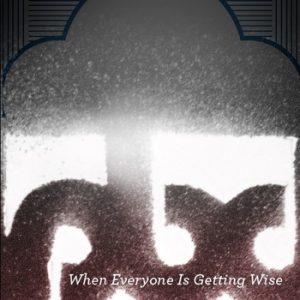From The Horse's Mouth: Paul Bugala and David Diaz (pbd) on When Everyone Is Getting Wise
When Everyone Is Getting Wise is the second release by DC prog-rock band pbd. The album is pbd’s second collaboration with producer Devin Ocampo (Deathfix, Medications, Beauty Pill, Smart Went Crazy, Faraquet, etc.). Its nine songs are an unpredictable blend of punk, folk, metal, and prog that demonstrate the musicianship and songwriting skills of two veteran performers.
Ghettoblaster caught up with guitarist/vocalist Paul Bugala and drummer/guitarist David Diaz to discuss the record. This is what he told us about it…
When did you begin writing the material for your most recent album?
In late August of 2011, we tried to tinker with different ideas. We even tried to jam with some other folks to see where that might take us, but it just kind of fizzled. After that we went back to challenging each other and songs started taking shape. By early 2012, we had a good chunk of the material that would go on the new album. During that time, we also reworked a couple of old tunes that had been lying around. One is “Francis Xavier,” from the first album. The other is a tune that didn’t make it on the last album, but we’ve added it as a poorly hidden track on the new album. It’s something that’s been re-worked about eight times. We almost let it die, but it gets a great response live and the way it came together in the studio is pretty neat thanks in large part to the contributions of Devin Ocampo, who produced the record and plays on it a bunch.
What was the most difficult song to take from the initial writing stage through recording and mixing? Why was it so troublesome?
Definitely “Stand Back.” The writing stage was a little tough, but the recording aspect of it was extremely taxing. It’s has a rollicking 3/4 time with a staccato attack on vocals over a very busy guitar. Dave accents the verse sections with a triplet based, jazz-like sticking pattern between the bell and snare rim; however, when he tried to reference this pattern in a another section of the tune, it kind of fell apart. There are also these neat guitar flourishes during the chorus that were more implied than we had initially heard, and needed a little more articulation and breathing room. None of these issues were that apparent until we heard the playbacks and had someone take a closer listen. That whole cliche about the studio/recording process putting a band under a microscope couldn’t have been more true in this case.
Which of the songs on the record is most different from your original concept for the song?
The hidden track at the end, for sure. Years ago, we were just jamming at practice and stumbled upon this neat, slow waltz thing. Dave wrote lyrics and a melody for what he thought was going to be a very soft, almost Elliott Smith kind of vocal laid over the waltz. In fact, Emmy-Lou Harris’s “Waltz Across Texas” definitely springs to mind as a reference point for the idea Dave had, only much softer and much more understated. But things were kind of changing in the dynamic of our music. So the waltz got hyper-driven into something that sounded like Iron Maiden circa Rhyme of the Ancient Mariner minus the guitar-monies. That didn’t work out so well. So, we played it as fast as we could in 4/4 and that got a more enthusiastic response. So, that’s what you hear on the album.
Did you have any guest musicians play or sing on the record?
Our last record had a couple of guest musicians (Becky Warren of the Great Unknowns and Toby Fallsgraff of Daddy’s Gonna Kill Ralphie). That was the concept that we had always been into. We never wanted to be just a duo. We always imagined we’d be the center of gravity for a bunch of people who’d sit in with us live and play on the records. However, on this record, our schedules were such that we couldn’t arrange to have a big list of guests and rehearse and all that. But we were super lucky to have our producer and my guitar hero from way back, Devin Ocampo, chip in all over the place. He played bass on most, if not all tracks. He played keyboards. He also played guitar on the hidden track at the end, which featured him doing some twangy leads that are absolutely amazing and fun as hell.
How did Devin’s input change the face of the record?
Again, Devin (of Deathfix, Medications, Faraquet, Beauty Pill, Smart Went Crazy, the Mary Timony Band, etc.) produced the record. It’s hard to overstate how much his input helped us make what we think is a great recording. The guy is a virtuoso on numerous instruments as well as a tech wizard. But, aside from that, he’s also tremendously passionate about the creative process and helping musicians get where they want to go. We worked out an arrangement with him that allowed us to do something like seven or eight tracking sessions over three or four months. It was simply amazing to be able to spend that much time with him and learn about the development of a tune — both from an aesthetic and technical view. He also really embraces the idea of becoming an additional “member” of the band during the recording process. A good example of his input is what we referenced earlier about the problems on the track “Stand Back.” Because Devin is a drummer, he could hear how some of the clunkier parts could be smoothed out. And because he is also a guitarist, there was a similar ability for him to convey what was missing and what was needed.
Is there an overarching concept behind your new album that ties the record together?
If there is an overarching concept, it’s the tension between where I want to take the record, and where Dave wants it to go. In many music partnerships, you’ll see a guy come in who’s, say, a blues guy, and he may team up with someone else who’s, say, a jazz girl. The blues guy will meet the jazz girl, half-way, so to speak. He’ll play in his bluesy fashion, but restrain it somewhat to accommodate the jazz girl, who, in turn, will approach in similar fashion. But both of us want to move beyond what we’ve done before and explore new ideas. My guitar playing and singing come mostly from a folk and punk sensibility. Dave comes from a prog-metal background. The songs are like a surveillance video of us snooping around in each other’s backyards. For example, the basic structure of “Open Letter” is twangy, but I added a lot of busy parts and stops and starts. While Dave brought in the Power Windows-style intro/outro, but made sure other parts were a more straightforward and understated. In the end, you get this fun ride.
Have you begun playing these songs live and which songs have elicited the strongest reaction from your fans?
Yes, we have played the songs live for a while. The strongest reaction we have gotten is from a song called “Egon.” It’s a Frankenstein of varying parts and time changes. It has somewhat of a retro, DC sounding verse with some abrupt, up-tempo, slightly jammy time changes thrown in. Again, we think it’s just a fun ride. People also seem to like “Ghost Strokes on the Bell,” which is a summer jam for anyone who’d put The Impressions and Van Halen on the same mix tape.
(The tracks “Ghost Strokes on the Bell” and “Egon” can be streamed here (https://soundcloud.com/pbddc). Catch the band live at these locations:
Thursday, May 9 – Washington, DC at Velvet Lounge (www.velvetloungedc.com) w/ The Californians [debut] (release show and benefit for Publish What You Pay www.pwypusa.org)
Friday, May 10 – Dayton, Ohio at South Park Tavern w/ The 1984 Draft (the1984draft.bandcamp.com), The Kyle Sowashes (myspace.com/kylesowash), Tender Mercy (tendermercy.bandcamp.com)
Saturday, May 11 – Columbus, Ohio at Treebar (treebarcolumbus.com) w/ The 1984 Draft, The Kyle Sowashes, Tender Mercy
Sunday, May 12 – Cleveland, Ohio – Now That’s Class (www.nowthatsclass.net) w/ stabsliceandcut (ft: Kevin Fagan))









Social Media